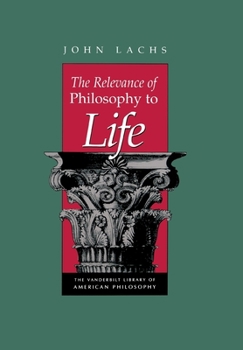The Relevance of Philosophy to Life
(Part of the Vanderbilt Library of American Philosophy Series)
Select Format
Select Condition 
Book Overview
With The Relevance of Philosophy to Life , eminent American philosopher John Lachs reminds us that philosophy is not merely a remote subject of academic research and discourse, but an ever-changing... This description may be from another edition of this product.
Format:Hardcover
Language:English
ISBN:0826512623
ISBN13:9780826512628
Release Date:April 1995
Publisher:Vanderbilt University Press
Length:296 Pages
Weight:1.45 lbs.
Dimensions:1.0" x 6.3" x 9.3"
Customer Reviews
1 rating
James, Dewey, and Philosophy Revived From the Dead!
Published by Thriftbooks.com User , 20 years ago
John Lachs is a rare breed. That is to say he is a philosopher who isn't much for the trend of current philosophy to use big words while saying nothing important. Of course, most philosophers say they are not for this, but their writing suggests their tacit endorsement of the trend. Lachs, on the other hand, is not only erudite and refreshingly enjoyable, but he also writes about real problems in the real world in real contexts. At last: a book that can keep both the philosopher and the non-philosopher fortified. This book is a somewhat loose collection of essays about such topics as moral relativism (which Lachs unabashedly admits that he is for), the right to die, the myth of a unified and singular human nature, technology, and...(suprise suprise... the relevance of philosophy to life. Lachs comes from a quite pragmatic tradition and while there are more index cites of Dewey, he is to my eyes more at home with James. One of the big ideas in the book, in fact, is the existence of choice inclusive facts. Take the term 'human nature' (which is said to mean one definite thing - our essence). There are seemingly infinite traits we have, but when we are deciding what is and is not human nature, we CHOOSE which traits to emphasize and which not to. What's more, it is doubtful that EVERYONE who is human has ALL of our suggested traits (and animals might even have some of them). Does that mean 'human nature' is a social construct? No. It simply means that while the laundrey list of traits we can choose from is objective and really existing, the traits we choose to recognize as part of its description is based on human convention. This is straight out of the James playbook (as James, like Lachs, was a non-essentialist who saw 'essentials' as simply those traits of a thing we pay attention to out of the many the thing has). This is a big idea and thrusts much of his book. When talking of morals, one of the biggest thrust of moral objectivism has been that morals are what accord with 'human nature' (natural law). But being that our natures are plural (we vary a great deal from eachother), there can't be any 'one' human nature. When talking about the right to die, this idea also serves as a spring-board.All of the essays are worth reading. Aside from the idea above there are many meaty ones in here and as the book touches so many subjects, the reader will not be bored. The only other thing I feel needs saying about Lachs is that he is simply one of the best essay writers in philosophy that I've read. From the first paragraph (which is usually some intriguing hook - the technique of a novelist) to the last sentence, these essays are quie satisfying.




